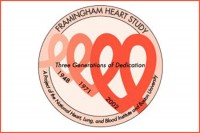Atrial Fibrillation Associated with Reduced Frontal Lobe Volume
It is well established that Atrial Fibrillation (AF), a common heart arrhythmia, is associated with an increased risk of stroke and cognitive  decline. However, the impact of AF on brain structure has not been properly studied. According to a recent Framingham Heart Study, people who experience AF, may also suffer from a smaller brain, specifically reduced frontal lobe volume.
decline. However, the impact of AF on brain structure has not been properly studied. According to a recent Framingham Heart Study, people who experience AF, may also suffer from a smaller brain, specifically reduced frontal lobe volume.
Rhoda Au, PhD, Professor of Anatomy, Neurobiology, Neurology and Epidemiology at Boston University Schools of Medicine (BUSM) and Public Health (BUSPH), used magnetic resonance imaging (MRI) to look at the relationship between AF and brain volume. Read the article
“We believe that good heart health also contributes to good brain health and given that the incidence of AF is expected to more than double in the next three decades, we are interested in understanding the association between AF and brain anatomy,” explained Au, corresponding author, who also serves as director of neuropsychology for the Framingham Heart Study.
After adjusting for several confounders such as age, gender, and vascular risk factors, the researchers found that AF was associated with smaller frontal lobe volumes. Further research will determine whether these structural findings have functional implications on cognitive skills such as executive function and problem solving.
This work represents collaboration between the Department of Neurology, BUSM; the Framingham Heart Study; the Department of Medicine, University of California, San Francisco; Department of Biostatistics, Boston University School of Public Health; Department of Neurology, University of California, Davis; Department of Medicine, BUSM.
Funding for this study was provided by Framingham Heart Study’s National Heart, Lung, and Blood Institute contract (N01-HC-25195; HHSN268201500001I), by grants (R01-AG016495, R01-AG008122, R01-AG033040) from the National Institute on Aging, and by grant (R01-NS017950) from the National Institute of Neurological Disorders and Stroke, and 1R01HL128914; 2R01HL092577; 3R01HL092577-06S1.